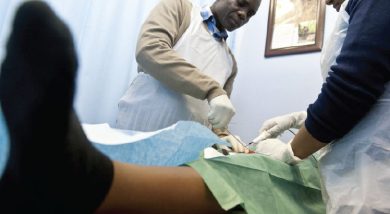Covid vaccine sparks hope, hesitancy
The most stressful day for physiotherapist Duncan Banda was when a Covid-19 field hospital in Lilongwe ran out of oxygen cylinders. There were just four physiotherapists to help 59 patients with breathing difficulties.
“We had to reposition patients, do deep breathing techniques and intensive physiotherapy. We lost four patients in four hours that day,” he recalls.
One of the deceased was Banda’s fellow health worker.
“I helped him, fed him and did the chest physiotherapy until he got better and picked up to 88 percent oxygen saturation. I left him to attend another patient who was choking. I saved that patient and after 15 minutes, when I looked back to my workmate, he was dead. That was the first time I cried in the ward,” he explains.

Banda heads the physiotherapy department at Bwaila Hospital. From the time the first Covid-19 cases were recorded in Lilongwe, he has been part of the team treating cases and tracing contact.
Physiotherapy has been quite critical in managing Covid-19 patients with breathing problems.
“We only admit those who are unable to breathe independently. For those on machines, chest physiotherapy techniques help as we try to wean the patients off. We help them breathe and expand their lungs,” he explains.
As Covid-19 admissions increased in Malawi, oxygen supplies started running out.
With support from the UK Foreign and Commonwealth Development Office, Unicef installed an oxygen plant at one of the biggest hospitals in the country, reducing the pressure faced by frontline health workers.
A pandemic like no other
The impact of Covid-19 goes beyond the health sector. Learning was disrupted for an entire generation of children. Some 7.7 million children attending preschool, primary and secondary education stayed home for over five months. Only 2.6 million could access remote learning from home through an emergency radio programme and online classes.
The disease has claimed about 1150 lives from the country’s 34 100 confirmed cases.
Banda remembers the early days, when people did not think that the pandemic was real. Angry mobs attacked health workers deployed to trace contacts.
“So many died even as we worked tirelessly to save people. You assist someone, leave them stable and 30 minutes later they are gone. So, it was frustrating to see all the misinformation and conspiracies among the public and on social media,” he recalls.
Timely intervention
For Banda and many other health workers, the arrival of the Covid-19 vaccine in Malawi brings hope that the pandemic could finally end.
Unicef, the largest vaccine buyer in the world, is coordinating and supporting the procurement, international freight and delivery of Covid-19 vaccines to 95 developing countries under the Covax facility.
Malawi received its first 360 000 doses in March. The country has received 102 000 doses through the African Union and another 50 000 from the Government of India.
Across the country, health workers and other frontline workers, people aged over 60 and those with underlying health conditions that increase the risk of dying from the virus are receiving the vaccine.
The vaccination teams typically comprise a nurse, a community health worker, a data entry clerk and a clinician in case of side effects such as convulsions on site.
However, vaccine hesitancy has been reported in some areas and populations, including among health workers. Lucy Kakowe leads a team of vaccinators in Dedza, an hour outside the capital city. As they administered the first doses to frontline workers, a few did not show up saying they wanted to observe those who get the jab first to see if there would be any side effects.
By April 18, almost 39 000 of about 257 754 people vaccinated were health workers.
Unicef helps the government safely store and transport vaccines by improving the cold chain system. The United Nations children’s agency also supported the development of Covid-19 vaccination training materials for health workers as well as awareness campaigns to generate demand and improve public acceptance of the new vaccine.
However, vaccine hesitancy could derail global efforts to end the pandemic, says Unicef Malawi representative Rudolf Schwenk.
He explains: “It is important to ensure that there are trusted sources of vaccine information that can be accessed by the general public. As more people get the vaccine, we are filled with hope that the vaccine offers a first step back to normality, that children can continue to learn and access the services they need.”
When one is vaccinated, it is important to keep wearing masks, washing hands regularly and keeping a distance from others.





